#poorest nations
Explore tagged Tumblr posts
Text
‘Developing countries’ are trapped in a new debt crisis
Wealth flowing from poorest nations to the richest. World Bank and IMF must go!
#developing countries#debt crisis#wealth#poorest nations#richest nations#world bank#imf#international monetary fund#killyourlocalcapitalist#killyourlocalbanker#killyourlocalfascist#killyourlocalnazi#ausgov#politas#auspol#tasgov#taspol#australia#fuck neoliberals#neoliberal capitalism#anthony albanese#albanese government#eat the rich#eat the fucking rich#class war#capitalism#anti capitalist#washington capitals#capitalist hell#capitalist dystopia
0 notes
Text
If there’s something wrong with my health, I hope it kills me quickly and painlessly bc I don’t have health insurance.
The US doesn’t give a shit about its citizens. Our health care is a fucking joke.
#health care#American health care#fucked up#how are we the richest nation and also let our poorest citizens die#our health care system is a wreck
3 notes
·
View notes
Text
yemen is the poorest nation in the arab world. but in two weeks time, it did what no oil or gas- rich arab nation could do. by seizing three ships and costing i****l more than 2 billion by forcing its ships to go around africa, yemen showed up.
82K notes
·
View notes
Text
It is over and everything is lost. This is the refrain repeated by Armenian families as they take that final step across the border out of their home of Nagorno-Karabakh.
In just a handful of days more than 100,000 people, almost the entire Armenian population of the breakaway enclave, has fled fearing ethnic persecution at the hands of Azerbaijani forces. The world barely registered it. But this astonishing exodus has vanished a self-declared state that thousands have died fighting for and ended a decades-old bloody chapter of history.
On Saturday, along that dusty mountain road to neighbouring Armenia, a few remaining people limp to safety after enduring days in transit.
Among them is the Tsovinar family who appear bundled in a hatchback littered with bullet holes, with seven relatives crushed in the back. Hasratyan, 48, the mother, crumbles into tears as she tries to make sense of her last 48 hours. The thought she cannot banish is that from this moment forward, she will never again be able to visit the grave of her brother killed in a previous bout of fighting.
“He is buried in our village which is now controlled by Azerbaijan. We can never go back,” the mother-of-three says, as her teenage girls sob quietly beside her.
“We have lost our home, and our homeland. It is an erasing of a people. The world kept silent and handed us over”.
She is interrupted by several ambulances racing in the opposite direction towards Nagorno-Karabakh’s main city of Stepanakert, or Khankendi, as it is known by the Azerbaijani forces that now control the streets. Their job is to fetch the few remaining Karabakh Armenians who want to leave and have yet to make it out.
“Those left are the poorest who have no cars, the disabled and elderly who can’t move easily,” a first responder calls at us through the window. “Then we’re told that’s it.”
As the world focused on the United Nations General Assembly, the war in Ukraine and, in the UK, the felling of an iconic Sycamore tree, a decades old war has reignited here unnoticed.
It ultimately heralded the end of Nagorno-Karabakh, a breakaway Armenian region, that is internationally recognised as being part of Azerbaijan but for several decades has enjoyed de facto independence. It has triggered the largest movement of people in the South Caucasus since the collapse of the Soviet Union.
Azerbaijan has vehemently denied instigating ethnic cleansing and has promised to protect Armenians as it works to reintegrate the enclave.
But in the border town of Goris, surrounded by the chaotic arrival of hundreds of refugees, Armenia’s infrastructure minister says Yerevan was now struggling to work out what to do with tens of thousands of displaced and desperate people.
“Simply put this is a modern ethnic cleansing that has been permitted through the guilty silence of the world,” minister Gnel Sanosyan tells The Independent, as four new busses of fleeing families arrive behind him.
“This is a global shame, a shame for the world. We need the international community to step up and step up now.”
The divisions in this part of the world have their roots in centuries-old conflict but the latest iterations of bitter bloodshed erupted during the collapse of the Soviet Union. The Karabakh Armenians, who are in the majority in the enclave, demanded the right to autonomy over the 4,400 square kilometre rolling mountainous region that has its own history and dialect. In the early 1990s they won a bloody war that uprooted Azerbaijanis, building a de facto state that wasn’t internationally unrecognised.
That is until in 2020. Azerbaijan, backed by Turkey, launched a military offensive and took back swathes of territory in a six-week conflict that killed thousands of soldiers and civilians. Russia, which originally supported Armenia but in recent years has grown into a colder ally, brokered a fragile truce and deployed peacekeepers.
But Moscow failed to stop Baku in December, enforcing a 10-month blockade on Nagorno-Karabakh, strangling food, fuel, electricity and water supplies. Then, the international community stood by as Azerbaijan launched a 24-hour military blitz that proved too much for Armenian separatist forces. Outgunned, outnumbered and weakened by the blockade, they agreed to lay down their weapons.
For 30 years the Karabakh authorities had survived pressure from international powerhouses to give up statehood or at least downgrade their aspirations for Nagorno-Karabakh. For 30 years peace plans brokered by countries across the world were tabled and shelved.
And then in a week all hope vanished and the self-declared government agreed to dissolve.
Fearing further shelling and then violent reprisals, as news broke several Karabakh officials including former ministers and separatist commanders, had been arrested by Azerbaijani security forces, people flooded over the border.
At the political level there are discussions about “reintegration” and “peace” but with so few left in Nagorno-Karabakh any process would now be futile.
And so now, sleeping in tents on the floors of hotels, restaurants and sometimes the streets of border towns, shellshocked families, with a handful of belongings, are trying to piece their lives together.
Among them is Vardan Tadevosyan, Nagorno-Karabakh’s minister of health until the government was effectively dissolved on Thursday. He spent the night camping on the floor of a hotel, and carries only the clothes he is wearing. Exhausted he says he had “no idea what the future brings”.
“For 25 years I have built a rehabilitation centre for people with physical disabilities I had to leave it all behind. You don’t know how many people are calling me for support,” he says as his phone ringed incessantly in the background throughout the interview.
“We all left everything behind. I am very depressed,” he repeats, swallowing the sentence with a sigh.
Next to him Artemis, 58, a kindergarten coordinator who has spent 30 years in Steparankert, says the real problems were going to start in the coming weeks when the refugees outstay their temporary accommodation.
“The Azerbaijanis said they want to integrate Nagorno-Karabakh but how do you blockade a people for 10 months and then launch a military operation and then ask them to integrate?” she asks, as she prepares for a new leg of the journey to the Armenian capital where she hopes to find shelter.
“The blockade was part of the ethnic cleansing. This is the only way to get people to flee the land they love. There is no humanity left in the world.”
Back in the central square of Goris, where families pick through piles of donated clothes and blankets and aid organisations hand out food, the loudest question is: what next?
Armenian officials are busy registering families and sending them to shelters in different corners of the country. But there are unanswered queries about long-term accommodation, work and schooling.
“I can’t really think about it, it hurts too much,” says Hasratyan’s eldest daughter Lilet, 16, trembling in the sunlight as the family starts the registration process.
“All I can say to the world is please speak about this and think about us. We are humans, people made of blood, like you and we need your help.”
8K notes
·
View notes
Text
If a war between Iran and Israel really will emerge it will not just be Iranians who will suffer, but every country in the region will be somewhat involved, which includes some nations that are already declared as one of the poorest, most war-torn and starved nations in the world. All of whom all be completely unprotected while Israel wreak havoc on their citizens (excluding those who live in puppet-states aligned with the US) with full-support and funding from the US and other Western superpowers to ensure that no matter happens, their influence and interests in the Middle East will not be lost and they'e willing to sacrifice the lives of as many non-Israeli civilians as they want to in order to achieve their goal.
This is one of the reasons they implanted this cancerous tumor called Israel in our region, to act as military base that cause instability and state-sponsored terrorism in the area so that it would be easier for them to exploit these failed-states that surround it and the best part is? All they have to do to maintain this military base is give them a couple billions and some weapons yearly so that those blood-lust Zionist settlers can do all the dirty work for them, that's NOTHING compared to the costs and casualties of other wars that had the US be directly involved in like Vietnam or Iraq or Afghanistan (off the record; but that's exactly why they're using Saudi Arabia to indirectly destroy Yemen, they learned their lesson, its always better to use a proxy.)
If a war breaks out? The US will not be in any real danger, because they're half-way across the world and all the fighting will be in West Asia and North Africa, far away from them. No American building is in danger of being destroyed, no American city is under the threat of being bombed, the average American citizen will not be in any danger and can just continue living their life like normal, hence why they're always the first ones to start making those WW3 memes, because they're not the ones in danger of dying.
This is precisely why the US's imperialism in the Middle East hasn't slowed down in decades, because they do not suffer any negative consequences from it. All the destruction and casualties they cause is inflicted solely on the native people and the native people only, for the US, they only have things to gain from these wars, whether it was stolen resources or more instability that will further their control and influence in the area.
The US, like every single oppressive empire in history, will not suddenly grow a conscious over-night and immediately halt all their wrongdoings simply because they don't want the innocent people in other countries to suffer anymore. The only way to stop their imperialism is to have them believe that its not worth it anymore, to have the cons of being involved in our region out-weight the pros.
Because at the moment if the only cons here are "innocent Muslims will die"? Then those motherfucking colonizers will NOT stop, they will only stop once it reaches a point where its also the colonizers who are dying alongside the native population and the first step for that to happen is to dismantle this giant settler-colony built square in the middle of our region and forcing these Western Superpowers to choose between continuously spending trillions of dollars to maintain their interests directly or to fucking leave us alone already and save those trillions for something else.
#anti US#anti israel#anti zionist#anti Israeli#anti zionisim#iran#gaza#palestine#palestinian#yemen#joe biden
2K notes
·
View notes
Text
"Cody Two Bears, a member of the Sioux tribe in North Dakota, founded Indigenized Energy, a native-led energy company with a unique mission — installing solar farms for tribal nations in the United States.
This initiative arises from the historical reliance of Native Americans on the U.S. government for power, a paradigm that is gradually shifting.
The spark for Two Bears' vision ignited during the Standing Rock protests in 2016, where he witnessed the arrest of a fellow protester during efforts to prevent the construction of the Dakota Access Pipeline on sacred tribal land.
Disturbed by the status quo, Two Bears decided to channel his activism into action and create tangible change.
His company, Indigenized Energy, addresses a critical issue faced by many reservations: poverty and lack of access to basic power.
Reservations are among the poorest communities in the country, and in some, like the Navajo Nation, many homes lack electricity.
Even in regions where the land has been exploited for coal and uranium, residents face obstacles to accessing power.
Renewable energy, specifically solar power, is a beacon of hope for tribes seeking to overcome these challenges.
Not only does it present an environmentally sustainable option, but it has become the most cost-effective form of energy globally, thanks in part to incentives like the Inflation Reduction Act of 2022.
Tribal nations can receive tax subsidies of up to 30% for solar and wind farms, along with grants for electrification, climate resiliency, and energy generation.
And Indigenized Energy is not focused solely on installing solar farms — it also emphasizes community empowerment through education and skill development.
In collaboration with organizations like Red Cloud Renewable, efforts are underway to train Indigenous tribal members for jobs in the renewable energy sector.
The program provides free training to individuals, with a focus on solar installation skills.
Graduates, ranging from late teens to late 50s, receive pre-apprenticeship certification, and the organization is planning to launch additional programs to support graduates with career services such as resume building and interview coaching...
The adoption of solar power by Native communities signifies progress toward sustainable development, cultural preservation, and economic self-determination, contributing to a more equitable and environmentally conscious future.
These initiatives are part of a broader movement toward "energy sovereignty," wherein tribes strive to have control over their own power sources.
This movement represents not only an economic opportunity and a source of jobs for these communities but also a means of reclaiming control over their land and resources, signifying a departure from historical exploitation and an embrace of sustainable practices deeply rooted in Indigenous cultures."
-via Good Good Good, December 10, 2023
#indigenous#native americans#first nations#indigenous rights#tribal sovereignty#solar energy#solar power#solar panels#renewable energy#green energy#sioux#sioux nation#sustainability#climate hope#electrification#united states#hope#good news
2K notes
·
View notes
Text
Having finally played through both options for Veilguard and having to choose either Treviso or Minrathous, I can conclude one thing: there is absolutely no correct choice in either scenario.
By choosing to save Treviso, you leave violent Imperial-Supremacist slavers in charge of one of Thedas' most powerful nation. The only force with any resistance against them is all but decimated, if not by the Blighted Dragon attack then by the Venatori themselves. The hanged bodies in the streets all but taunt you as a reminder that nobody, especially the poorest and most vulnerable in Docktown, could ever hope to stand up to their power.
But by choosing to save Minrathous, you subject a city built on canals to a newer, more ferocious form of the Blight. In just a few main missions earlier Rook saw in D'Meta's Crossing just how devastating it can be. It seeps into the water, grows in the crevices of every building, and consumes everything to create new horrors. The once thriving markets that stood up to even the Antaam's occupation are gutted and turned into hospitals to care for their already suffering people.
The choice Rook makes isn't about deciding which city and its faction is more deserving of help. There is no "right" answer. There is no "morally superior" choice. The most vulnerable people suffer and die in either city either way.
The Minrathous-or-Treviso decision Rook makes is about there being no good options, but having to make those choices anyway. It is knowing that when you are presented with poor options, no matter your reasoning or how superficial it is, you have to decide.
The only wrong decision Rook could have made was to choose to do nothing at all.
#also I need people to understand: Neve and Lucanis both have entirely reasonable reactions to the destruction of their cities#neither one of them react incorrectly or too harshly compared to the other - some of you just hate women#Lucanis not being available to romance makes sense#Neve being cagey and feeling like nobody shows up for Dock Town makes sense!!#neither of them are wrong for that!!#dragon age the veilguard#dragon age#bioware#dragon age the veilguard spoilers#veilguard spoilers#minrathous#treviso#neve gallus#lucanis dellamorte#neve dragon age#lucanis dragon age
403 notes
·
View notes
Text
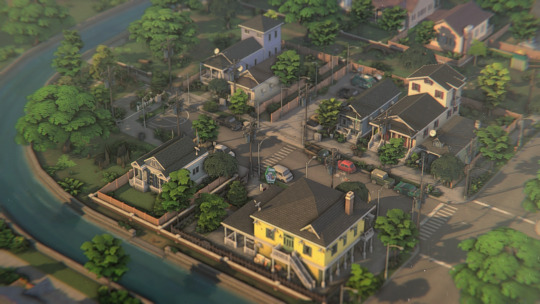
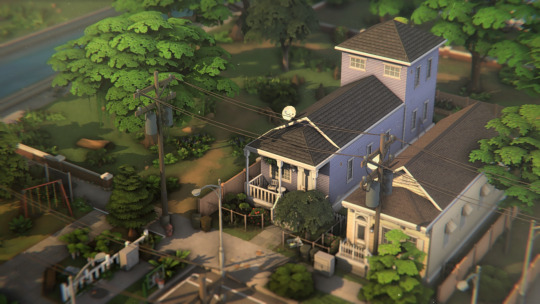
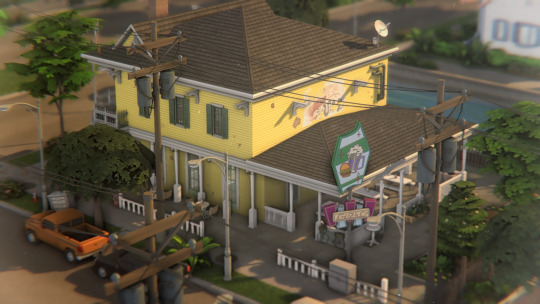
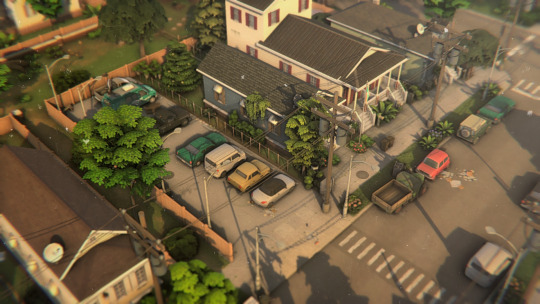
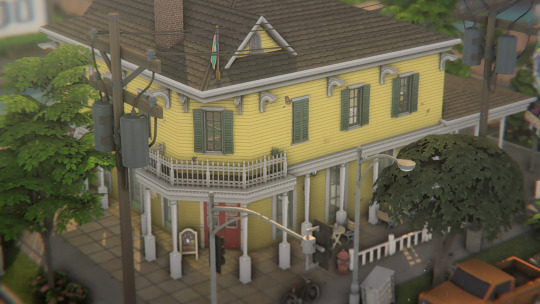
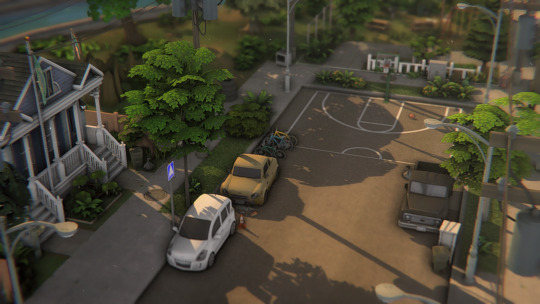
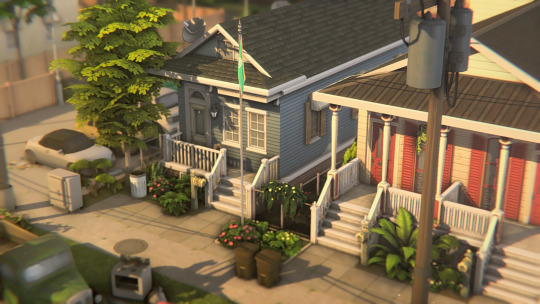
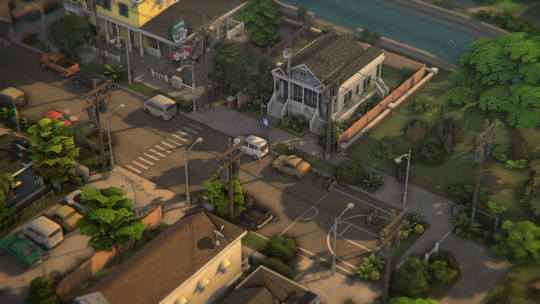
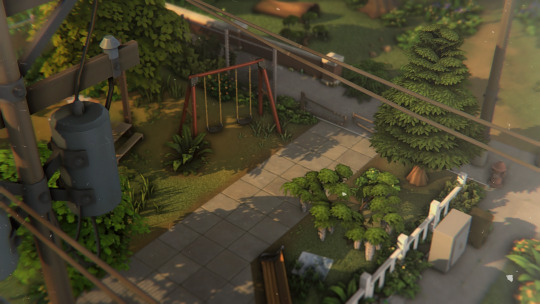
foundry cove neighborhood 🍃
at the very beginning of my account, I had shared a first version of the foundry cove neighborhood. nevertheless, I thought a lot about the style i wanted for my save and decided to redo everything. this neighborhood and willow creek central park are the most "swampy" parts of the city, unlike the other neighborhoods where you can find exotic plants. foundry cove is also the poorest part of the city, and it's also very poorly maintained, which is why it's polluted by a lot of garbage on the street.
you can find here:
a restaurant (a snack)
a national park
a two-unit residential rental
a three-unit residential rental
a vacation rental
2K notes
·
View notes
Text
Prison-tech company bribed jails to ban in-person visits
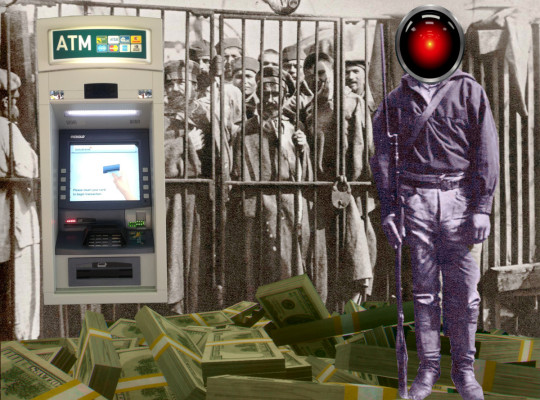
I'm on tour with my new, nationally bestselling novel The Bezzle! Catch me in BOSTON with Randall "XKCD" Munroe (Apr 11), then PROVIDENCE (Apr 12), and beyond!

Beware of geeks bearing gifts. When prison-tech companies started offering "free" tablets to America's vast army of prisoners, it set off alarm-bells for prison reform advocates – but not for the law-enforcement agencies that manage the great American carceral enterprise.
The pitch from these prison-tech companies was that they could cut the costs of locking people up while making jails and prisons safer. Hell, they'd even make life better for prisoners. And they'd do it for free!
These prison tablets would give every prisoner their own phone and their own video-conferencing terminal. They'd supply email, of course, and all the world's books, music, movies and games. Prisoners could maintain connections with the outside world, from family to continuing education. Sounds too good to be true, huh?
Here's the catch: all of these services are blisteringly expensive. Prisoners are accustomed to being gouged on phone calls – for years, prisons have done deals with private telcos that charge a fortune for prisoners' calls and split the take with prison administrators – but even by those standards, the calls you make on a tablet are still a ripoff.
Sure, there are some prisoners for whom money is no object – wealthy people who screwed up so bad they can't get bail and are stewing in a county lockup, along with the odd rich murderer or scammer serving a long bid. But most prisoners are poor. They start poor – the cops are more likely to arrest poor people than rich people, even for the same crime, and the poorer you are, the more likely you are to get convicted or be suckered into a plea bargain with a long sentence. State legislatures are easy to whip up into a froth about minimum sentences for shoplifters who steal $7 deodorant sticks, but they are wildly indifferent to the store owner's rampant wage-theft. Wage theft is by far the most costly form of property crime in America and it is almost entirely ignored:
https://www.theguardian.com/us-news/2023/jun/15/wage-theft-us-workers-employees
So America's prisons are heaving with its poorest citizens, and they're certainly not getting any richer while they're inside. While many prisoners hold jobs – prisoners produce $2b/year in goods and $9b/year in services – the average prison wage is $0.52/hour:
https://www.dollarsandsense.org/archives/2024/0324bowman.html
(In six states, prisoners get nothing; North Carolina law bans paying prisoners more than $1/day, the 13th Amendment to the US Constitution explicitly permits slavery – forced labor without pay – for prisoners.)
Likewise, prisoners' families are poor. They start poor – being poor is a strong correlate of being an American prisoner – and then one of their breadwinners is put behind bars, taking their income with them. The family savings go to paying a lawyer.
Prison-tech is a bet that these poor people, locked up and paid $1/day or less; or their families, deprived of an earner and in debt to a lawyer; will somehow come up with cash to pay $13 for a 20-minute phone call, $3 for an MP3, or double the Kindle price for an ebook.
How do you convince a prisoner earning $0.52/hour to spend $13 on a phone-call?
Well, for Securus and Viapath (AKA Global Tellink) – a pair of private equity backed prison monopolists who have swallowed nearly all their competitors – the answer was simple: they bribed prison officials to get rid of the prison phones.
Not just the phones, either: a pair of Michigan suits brought by the Civil Rights Corps accuse sheriffs and the state Department of Corrections of ending in-person visits in exchange for kickbacks from the money that prisoners' families would pay once the only way to reach their loved ones was over the "free" tablets:
https://arstechnica.com/tech-policy/2024/03/jails-banned-family-visits-to-make-more-money-on-video-calls-lawsuits-claim/
These two cases are just the tip of the iceberg; Civil Rights Corps says there are hundreds of jails and prisons where Securus and Viapath have struck similar corrupt bargains:
https://civilrightscorps.org/case/port-huron-michigan-right2hug/
And it's not just visits and calls. Prison-tech companies have convinced jails and prisons to eliminate mail and parcels. Letters to prisoners are scanned and delivered their tablets, at a price. Prisoners – and their loved ones – have to buy virtual "postage stamps" and pay one stamp per "page" of email. Scanned letters (say, hand-drawn birthday cards from your kids) cost several stamps:
https://pluralistic.net/2024/02/14/minnesota-nice/#shitty-technology-adoption-curve
Prisons and jails have also been convinced to eliminate their libraries and continuing education programs, and to get rid of TVs and recreational equipment. That way, prisoners will pay vastly inflated prices for streaming videos and DRM-locked music.
The icing on the cake? If the prison changes providers, all that data is wiped out – a prisoner serving decades of time will lose their music library, their kids' letters, the books they love. They can get some of that back – by working for $1/day – but the personal stuff? It's just gone.
Readers of my novels know all this. A prison-tech scam just like the one described in the Civil Rights Corps suits is at the center of my latest novel The Bezzle:
https://us.macmillan.com/books/9781250865878/thebezzle
Prison-tech has haunted me for years. At first, it was just the normal horror anyone with a shred of empathy would feel for prisoners and their families, captive customers for sadistic "businesses" that have figured out how to get the poorest, most desperate people in the country to make them billions. In the novel, I call prison-tech "a machine":
a million-armed robot whose every limb was tipped with a needle that sank itself into a different place on prisoners and their families and drew out a few more cc’s of blood.
But over time, that furious empathy gave way to dread. Prisoners are at the bottom of the shitty technology adoption curve. They endure the technological torments that haven't yet been sanded down on their bodies, normalized enough to impose them on people with a little more privilege and agency. I'm a long way up the curve from prisoners, but while the shitty technology curve may grind slow, it grinds fine:
https://pluralistic.net/2021/02/24/gwb-rumsfeld-monsters/#bossware
The future isn't here, it's just not evenly distributed. Prisoners are the ultimate early adopters of the technology that the richest, most powerful, most sadistic people in the country's corporate board-rooms would like to force us all to use.

If you'd like an essay-formatted version of this post to read or share, here's a link to it on pluralistic.net, my surveillance-free, ad-free, tracker-free blog:
https://pluralistic.net/2024/04/02/captive-customers/#guillotine-watch

Image: Cryteria (modified) https://commons.wikimedia.org/wiki/File:HAL9000.svg
CC BY 3.0 https://creativecommons.org/licenses/by/3.0/deed.en
--
Flying Logos https://commons.wikimedia.org/wiki/File:Over_$1,000,000_dollars_in_USD_$100_bill_stacks.png
CC BY-SA 4.0 https://creativecommons.org/licenses/by-sa/4.0/deed.en
--
KGBO https://commons.wikimedia.org/wiki/File:Suncorp_Bank_ATM.jpg
CC BY-SA 3.0 https://creativecommons.org/licenses/by-sa/3.0/deed.en
#pluralistic#prison#prison-tech#marty hench#the bezzle#securus#captive audiences#St Clair County#human rights#prisoners rights#viapath#gtl#global tellink#Genesee County#michigan#guillotine watch#carceral state#corruption
1K notes
·
View notes
Text
A Big TB Announcement
Greetings from Washington D.C., where I spent the morning meeting with senators before joining a panel that included TB survivor Shaka Brown, Dr. Phil LoBue of the CDC, and Dr. Atul Gawande of USAID. Dr. Gawande announced a major new project to bring truly comprehensive tuberculosis care to regions in Ethiopia and the Philippines. Over the next four years, this project can bring over $80,000,000 in new money to fight TB in these two high-burden countries.
Our family is committing an additional $1,000,000 a year to help fund the project in the Philippines, which has the fourth highest burden of tuberculosis globally.
Here’s how it breaks down: The Department of Health in the Philippines has made TB reduction a major priority and has provided $11,000,0000 per year in matching funds to go alongside $10,000,000 contributed by USAID and an additional $1,000,000 donated by us. This $22,000,000 per year will fund everything from X-Ray machines, medications, and GeneXpert tests to training and employing a huge surge of community health workers, nurses, and doctors who are calling themselves TB Warriors. In an area that includes nearly 3,000,000 people, these TB Warriors will screen for TB, identify cases, provide curative treatment, and offer preventative therapy to close contacts of the ill. We know this Search-Treat-Prevent model is the key to ending tuberculosis, but we hope this project will be both a beacon and a blueprint to show that It’s possible to radically reduce the burden of TB in communities quickly and permanently. It will also, we believe, save many, many lives.
—
I believe we can’t end TB without these kinds of public/private partnerships. After all, that’s how we ended smallpox and radically reduced the global burden of polio. It’s also how we’ve driven down death from malaria and HIV. For too long, TB hasn’t had the kind of government or private support needed to accelerate the fight against the disease, but I really hope that’s starting to change. I’m grateful to USAID for spearheading this project, and also to the Philippine Ministry of Health for showing such commitment and prioritizing TB.
—
One reason this project is even possible: Both the cost of diagnosis (through GeneXpert tests) and the cost of treatment with bedaquiline are far lower than they were a year ago, and that is due to public pressure campaigns, many of which were organized by nerdfighteria. I’m not asking you for money (yet); Hank and I will be funding this in partnership with a few people in nerdfighteria who are making major gifts. But I am asking you to continue pressuring the corporations that profit from the world’s poorest people to lower their prices. I’ve seen some of the budgets, and it’s absolutely jaw-dropping how many more tests and pills are available because of what you’ve done as a community.
—
I don’t yet have the details on which region of the Philippines we’ll be working in, but it will be an area that includes millions of people–perhaps as many as 3 million. And it will include urban, suburban, and rural areas to see the different responses needed to provide comprehensive care in different communities. This will not (to start!) be a nationwide campaign, because even though $80,000,000 is a lot of money, it’s not enough to fund comprehensive care in a nation as large as the Philippines. But we hope that it will serve as a model–to the nation, to the region, and to the world–of what’s possible.
—
I’m really excited (and grateful) that our community gets to have a front-row seat to see the challenges and hopefully the successes of implementing comprehensive care. Just in the planning, this project has involved so many contributors–NGOs in the Philippines, global organizations like the Partners in Health community, USAID, the national Ministry of Health in the Philippines, and regional health authorities as well. There are a lot of partners here, but they’ve been working together extremely well over the last few months to plan for this project, which will start more or less immediately thanks to their incredibly hard work.
1K notes
·
View notes
Text

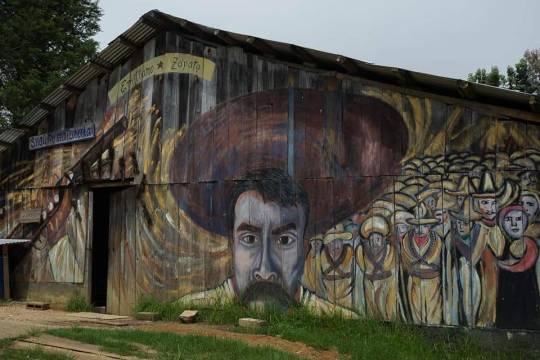
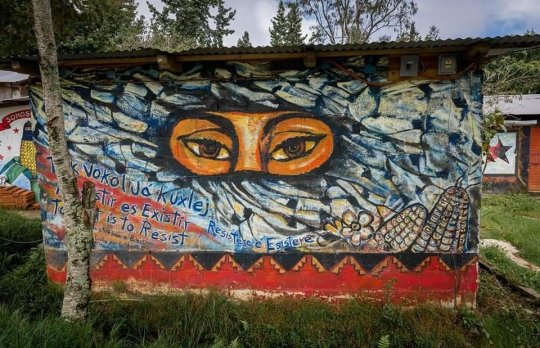
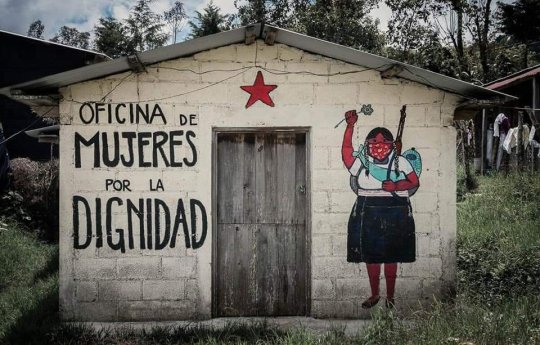
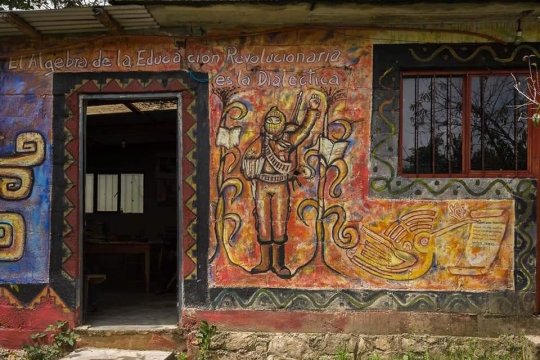


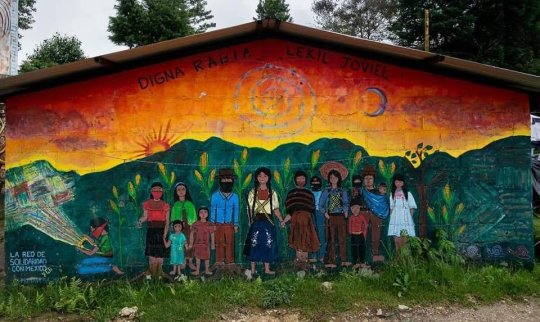
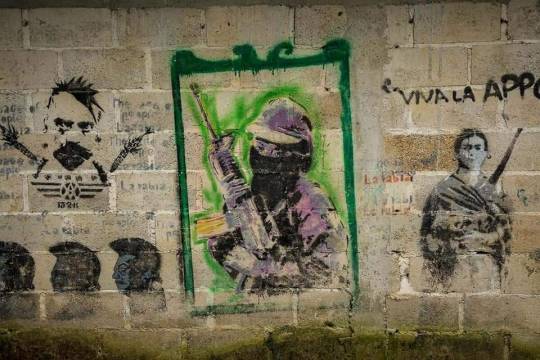

Radical murals seen around Oventic, an indigenous Zapatista village in Chiapas, Mexico.
On January 1st, 1994 the EZLN (Zapatista Army of National Liberation) launched an armed insurrection in Chiapas against the Mexican state and the NAFTA Free Trade Agreement.
The Zapatistas are a resistance movement of indigenous villagers in the mountains and jungles of Chiapas, Mexico’s poorest and southern-most state.
748 notes
·
View notes
Text
𝐰𝐚𝐧𝐭 𝐦𝐲 𝐡𝐞𝐚𝐫𝐭 𝐭𝐨 𝐛𝐞 𝐛𝐫𝐞𝐚𝐤𝐢𝐧’ || 𝐂𝐨𝐫𝐢𝐨𝐥𝐚𝐧𝐮𝐬 𝐒𝐧𝐨𝐰 𝐱 𝐟𝐞𝐦!𝐫𝐞𝐚𝐝𝐞𝐫

Summary_ where you follow Coriolanus to his exile, he asks you to marry him and have a life in the districts, but you find a notebook from Lucy Gray, with an specific lyrics of a song, discovering Coriolanus probably never truly loved you, but her.
Warnings_ angst, fluff, NSFW content, oral (f receiving), implied PIV sex, love triangle, Lucy Gray is slightly mean but we love her,
Notes_ pls listen along skin from Sabrina Carpenter <3
♪ ♫ Coryo playlist ✰ Index (+ fics here)
He was your love, your soulmate, your eternal companion.
Coriolanus and Tigris Snow found you as a little child in the streets during the war. You grew up with them. You worked scavenging to sell and make money. Coriolanus stated that he loved you when you two were nine years old. He made you his girlfriend the summer before starting senior year at the academy.
His exile made you a mess of tears, but you promised to follow him. Because you couldn’t leave him alone. Even worse when you had zero answers and there was an apartment debt.
You weren’t expecting any luck in the twelve. It was far from the Capitol and the less fortunate district. The streets were full of vendors who were willing to trade anything for a loaf of bread. And the people weren’t the kindest, especially when you arrived with two big suitcases and a silk dress with a fur coat. You screamed Capitol, and they didn’t like you.
For a long time, during your early days as a teenager, you and Coriolanus would go back to your house. It had been extremely difficult to gather your surviving belongings and search for items that would make enough money to survive the week. Your mother’s clothing had done everything to make you look like you weren’t hiding any financial issues. And your father’s suits helped to put a great impression on Coriolanus. The Hunger Games seemed to be what you two desperately needed. But things didn’t work in your favor.
The following morning after the games, when you woke up, Coriolanus was gone. He kissed you goodnight and went to sleep. Tigris told you everything and you quickly tried to contact your boyfriend but it didn’t work out.
In spite of desperation, you found a job at District 12, as a novice nurse. You quickly passed the test that proved you could defend yourself in the medical branch and after a signature, you were on your way to the twelve.
Without the prize, the chance to go to University was gone, you told your friends that Coriolanus and you decided to serve the nation and they believed it.
You walked through the savage streets of the poorest district of Panem, hoping to see your man. Under the military, he would be unlikely to have free time.
But to your luck, you heard his voice somewhere in the crowd.
“CORYO!” You screamed once you saw his broad shoulders walking in the opposite direction from you. He turned confused, but soon after spotted you and his eyes widened in surprise.
He started walking towards you, leaving behind his friends who also looked confused.
But you didn’t care, your smile grew and you started running towards him.
In his peacekeeper uniform and sweaty forehead, he looked gorgeous. And then you realized his hair was gone.
You collided in his chest and his strong arms embraced your waist, making you notice that had also gained muscle.
He was shocked, but all his moodiness from the Mockingjay hunt evaporated as soon as he reached you.
Just seconds after being in each other’s arms, he kissed you so desperately and you reciprocated with passion that ended up in a messy and addicting kiss.
Soon the two of you remembered you were in the middle of the street and that his friends were looking at you, loudly gossiping about the scene. You spotted Sejanus and smiled at him after he waved at you happily.
“You’re here,” he said surprised.
“Your curls are gone!” you replied and Coriolanus chuckled, kissing your forehead.
“Why are you here?” He asked this time. You sighed, cradling his face briefly.
“You kissed me goodnight and the next morning you were gone,” you say keeping a low tone that he appreciates.
“I didn’t want to hurt you. Sending you to bed knowing I would be gone? I know it would have cost you” he said, and you nodded.
“Tigris told me everything. With the debts and us not having the chance to attend university, I found a job at the local clinic. I will send money home and I could also be with you” he frowns.
“With your name, you could’ve asked for a loan. You could’ve asked for a job with Pluribus. Why didn’t you do that?” He asked taking your hand. You didn’t have to follow him. You could’ve stayed at the Capitol, not having to give up on much.
“What was the point if I wouldn’t have my love with me?” He can’t hide his smile. He feels lucky and proud that he already has a fine woman who loves him to death.
Then Coriolanus feels guilty because the reason he chose the twelve was because of Lucy Gray. He loved you, but there was something about his songbird that had enchanted him. Either way, you were here and he knew everything would be easier.
You smile back at him and he has to resist the urge to kiss you again.
“Come, I’ll present you to my friends and Sejanus who you already know” You nod, accepting the hand he offered you.
At that moment, Coriolanus felt relieved he had decided to keep whatever he had with Lucy Gray secret. Sejanus said he expected Coriolanus to respect you and not play with two girls, and so he should.
But no one said it would be easy.
…
Words well used solved as much as money did. The headmistress nurse already loved you, saying you were the most modest novice she’d ever had in her 35 years of experience. The way you usually spoke gave you many advantages upon your arrival in District 12. You got your own room, it was a little cottage. But it was your own.
Your schedule had you three days near the barracks where Coriolanus was able to sneak to be with you. The first weeks you couldn’t be with him during the weekends. You had to pass many tests and receive training.
Soon you fall into a routine that makes you question if that was it. Was there a future with Coriolanus in the wilderness of District 12?
The question is soon forgotten because Molly; one of your housemates knocked on your door. She had green eyes and gorgeous hair, like melted carrots. Usually sweet and loyal, she quickly became your friend. Molly came from District 2 and had gotten along Sejanus very well. Hence why she appeared early at your door with an indigo dress and red lipstick.
“Goodness! Where did you get that lipstick?” The girl grinned and showed her hands, full of cosmetics that almost made you gag.
“At the black market. I even got to pick shades” You picked a brick-toned lipstick and some smoked brown eyeshadows.
“Can I use these?” Molly nodded excitedly.
“Sure. We’ll share them. Next time you go and pick other shades if they have more” You never had a female friend like Molly. Capitol girls were colder, usually envious of minor matters, and unreliable. Anyhow, you considered most girls in your class family. Especially Clemensia Dovecote. She was close to you and Coriolanus, and if you had had more time, you would’ve confessed the truth to her.
Either way, you would be where you were, getting ready to have dinner with Coriolanus, Sejanus, and Molly as a double date. Sejanus was sweet enough to trade some of his ma’s treats in exchange for dollars and afford dinner. However, Molly and you were to pay entrance to the Hob with your first payment. Of course, you sent more than half of it to Tigris and Grandma’am.
“Look at you!” Molly made you twirl around her finger and made you laugh.
“You look lovely, y/n”
“And what about you?” She rolled her eyes playfully and proceeded to open the door for you.
The dress Tigris made for your seventeen birthday was pastel pink, but over the years collected dust and just hours before you left the Capitol she had dyed crimson with wine and other things her boss; Fabricia, had wasted. And now, it seemed to be a matter of attention in the twelve. Many girls turned to look at you and men did too.
However, you only had eyes for the blonde who waited for you at the entrance of the rustic cabin that served as a restaurant. His eyes sparkled and smiled at the sight of you.
“Hey, you…” you greeted, putting your arms around his neck. He chuckled, giving you a quick kiss.
“Hey, love” Both of them smiled at each other like idiots before Molly pulled you two inside the restaurant.
It was busy, full of peacekeepers and their wives. However, nobody paid attention to the two lower-ranking boys with their dates.
Since the pockets weren’t full enough to have a full dinner, Coriolanus and you shared a steak with mashed potatoes, gravy, and chunks of vegetables. Molly had soup with bread and Sejanus too.
You suddenly felt happy. You forgot you once had a life at the Capitol. You just lived the moment and realized it wasn’t as bad as you thought it was going to be. As long as you had Coriolanus by your side.
Soon after having dinner, Sejanus traded some of his ma’s treats and let you, Molly, Coriolanus, Beanpole, and Smiley to get inside the Hob. A bottle of white liquor appeared and everyone started drinking. Deep inside you, there was a kindred alcoholic who craved feeling light as a feather and acting silly.
Feeling tipsy, you barely notice the Covey and Lucy Gray entering the stage with an olive dress and dark blue makeup. Coriolanus stares at the songbird and soon he reminds the promises he made to the girl. He knows it’s too late to turn away. Lucy Gray had seen him with you. She seemed surprised but quickly looked away to talk to the audience and start singing.
Deep in the woods,
there was a girl.
Whom love thought she would find.
At the river,
she thought to have it found.
What a shame it was set to stall.
By crimson red,
her heart was paint.
One kind didn’t work out.
Then another came compliant,
And promised her good things.
Coriolanus soon realized Lucy Gray was probably talking about his failed relationship with Billy Taupe and now with him. But when did she write that song? The last time he saw her, was days before you came to the twelve. Perhaps Barb Azure or Maude Ivory were around and once saw him with you.
First was the river to plague with fright.
Then the bitter taste of treason,
Soon swallowed her that night.
If the girl haunts by the winter season,
Was cause’ love,
Would never be hers.
Deep in the woods,
there was a girl.
Whom love thought she would find.
At the river,
she thought to have it found.
What a shame it was set to stall.
But how could Coriolanus Snow choose Lucy Gray Baird when he had you there spinning in a gorgeous dress made by Tigris, with hot cheeks and disheveled hair, acting silly because you were slightly drunk. He knew he had to talk to Lucy Gray, but not at that moment. He was drunk as well, completely conscious but feeling like he could laugh at anything. So he went straight to his girl and gave her a big kiss on the lips.
His mates from the base cheered surprised to see him act so freely. But he couldn’t care less. Even if Commander Hoff appeared at that moment, nothing could take away the happiness he felt when you kissed him back.
A singer watched from afar and her voice creaked a little after the next song. Lucy Gray knew Coriolanus was trouble. He was Capitol and she was a free spirit. She also knew he had a girlfriend. But she thought that was over when he appeared weeks ago at the same place she was watching him kissing you.
And she couldn’t judge him. You were beautiful, looked sweet, and like you were immensely in love with Coriolanus. It broke her heart but she wouldn’t disturb her mind with that during a presentation. And when Lucy Gray focused on the public again, while singing, she also noticed you and Coriolanus had disappeared.
…
Nobody noticed when you two sneaked out of the Hob near midnight. Coriolanus and you had to stop at every block to kiss a little and then proceed to continue walking while holding hands and giggling. He was supposed to go back to the base but you begged him to spend the night with you.
Through stolen kisses and chuckles, you stumbled upon your door, quickly unlocked it, and pushed Coriolanus inside.
As soon as your hands locked you two in, you had your boyfriend starving for your touch.
“Coryo…” you whispered, urging him to lead the way to the creaky bed.
He understood, as always. His strong arms embraced you, caressing your hips and applying just the perfect amount of pressure that made you gasp in between kisses.
When your back landed on the mattress, you realized your legs had opened to accommodate him in between.
“You’re so fine, sweetheart” you had to giggle, knowing he was keeping many thoughts to himself.
“You sleep in the barracks, baby. I know you’ve grown a dirty mouth” his eyes widened, surprised to hear you say things like that. But it was true, Coriolanus had learned too many things he had no idea before. He understood men in the districts were wilder and dirtier. And he had to accept he had wondered with you included.
“How do you know?” You smirked kissing him again. Brushing your leg with his tent playfully.
“Because the districts are full of starved men.” he smiled.
Grinding each other with clothes on was all you’ve ever done. But now things felt different. Now you were kids assuming the role of adults. Both working, and both are being treated no longer as Capitol kids.
“Wait-… y/n. I don’t have any protection…” The least you needed now was bringing a kid into the world. You agreed, but you couldn’t help but sigh in annoyance.
Both of you stay quiet for a couple of seconds but Coriolanus caressed your waist, his mind busy.
“At the barracks, some of the guys have said something about tasting women…” your cheeks went hot, your legs squirmed together and Coriolanus noticed.
“Come here…” he turned you, making you sit on his lap.
“Sit on top of me”
“What?” He chuckled, grabbing your hips with possession.
“Don’t be shy, dear”
With continuous midnight sighs, your clothes flew away, and your hair ended up sticking to your forehead as you layer spread with Coriolanus in front of you. One hand working on your soaping folds and the other on his own pleasure.
The darkness of the room made it bearable due to heating even in the middle of the night. Molly and Sejanus never returned so what would stop you and your man from enjoying some time together?
He should’ve been sleeping at the barracks and you getting rid of the sinful evidence marking your sheets, hoping that the headmistress nurse wouldn’t notice. But there you were, moaning your boyfriend’s name like a mantra.
Which didn’t stop until a couple of hours before the sunrise.
…
Never in your wildest dreams, you thought you could’ve considered yourself happy at the districts. But you were.
Growing up with Coriolanus had always made you feel safe. But for some time you felt like you actually lived for each other.
Coriolanus was busy during the week, sometimes he wasn’t available on Saturdays, but mostly every day he made at least ten minutes to visit you at the clinic and see how your day was going.
To wear the nurse uniform during the summer was a dare. Long sleeves, aprons, tights, and heel shoes, are not the most comfortable.
But you grew used to it, especially when you worked at the labs and curation department.
Someone knocked on the door and soon it was opened, revealing Smiley, Beanpole, Sejanus, and lastly, Coriolanus.
“Gentlemen, What can I do for you?” You greeted them with a smile.
“A little accident during training. But mostly, we did a favor to your man” Beanpole said and you smiled even more.
Coriolanus offered you a playful smirk which made you blush.
“Well come in. Let me grab my kit” They started talking among each other but Coriolanus went straight to you.
“Rough day at the base?” The man nodded at you.
“At least Commander Hoff doesn’t hate me as much as old High-as-a-Kite-Bottom did”
you chuckle. But it doesn’t go unnoticed by you to see the way Coriolanus scratched his neck and arms.
“You caught an eczema flare up…”
“A rash?” You giggle at him. Coriolanus can’t help but think that you truly were learning medical stuff. You quickly had sutured Smiley’s finger and you rapidly knew what medicine would help Sejanus pollen allergy.
“Yes, a rash, Coryo. Take off your shirt, please” he obeyed.
When he turned around, he felt your fingers trailing the scars of the bombing. You had been taken away before you could know what had happened. Your tribute was killed for trying to escape. Soon you learn that Lucy Gray has saved Coriolanus’ life. You thanked her mentally. But you disliked the way Coriolanus couldn’t stop asking about her as soon as he woke up. Neither did the fact that his mother’s compact had disappeared from his room.
That’s forgotten when you start applying cream across the flare-up from his skin. He sighed in relief.
“I doubt there’s much hot water at the barracks but only take cold showers. That helps”
“Thanks, love” you nodded, kissing his cheek.
Coriolanus had his eyes set on you. He looked at your working hands cleaning the equipment you used, then to your parted lips demonstrating how concentrated you look. He smiled, only having you on his mind at the moment.
“I took the aptitude test to become an official” You dropped the tools, a smile growing on your face.
“Coryo! That’s great news, dear” you said excitedly, hurrying to embrace him.
“I would be able to move out of the barracks. We can get a little house with our incomes and you know… get married. Maybe some kids will run around our property. Who knows?…” your face blush but you can only nod.
You hug him even more tightly and he has to chuckle at your excitement.
“I’d love that…”
Coriolanus soon remembered his songbird and he had to seize the urge to seize. He had been with her as well. And nothing happened beyond stolen kisses and empty promises but still. It was cheating on you.
…
A little a week after Coriolanus applied to become an officer, Commander Hoff implied he had a great chance to pass the test. That made the boy very happy. He even told Tigris in a letter he would send more money, as well as the news he was going to break out that night to you. He couldn’t even remember he was supposed to meet Lucy Gray at The Covey’s cabin. He went straight to take a shower and couldn’t say no to Sejanus offering him one of his best shirts.
The Hob was full as usual. Drunk people everywhere. When Coriolanus entered The Covey was in their “backstage”, he sneaked through the hordes of people dancing because couldn’t risk letting you or Molly see him.
Lucy Gray had a gorgeous light brown dress with shiny makeup. She was drinking water when she spotted Coriolanus and smiled.
“Hey, I wasn’t expecting to see you now” she explained, walking towards him.
To be honest, Coriolanus wasn’t sure why he was there. But he was sure he had to talk to Lucy Gray before even seeing you again.
“Yeah. I wanted to talk to you…” her eyes sparkled with hope. Poor songbird.
“Sure. Spit it out…”
“I think you know by now that we work better as friends,” Coriolanus said.
“Oh”
The truth was that they were opposites. Even if you had broken up with Coriolanus for any reason and they decided to try it out seriously, they weren’t compatible. Lucy Gray wanted to be a free spirit and she thought too much about the people. Coriolanus mostly agreed with the Capitol and he firstly loved another woman. One who thought the same way he did.
“She really is the one. Right?” Lucy Gray questioned, obviously referring to you.
“I don’t want to hurt you, Lucy Gray”
“Oh but you already did”
“Yes, I should’ve told you what happened. But to be fair I didn’t even know myself. Can we be just friends?” He sounded tired and even a little desperate.
Lucy Gray frowned. She valued trust more than anything, he had broken that. But she played her best face and smiled.
“Sure. Friends…”
Coriolanus nodded, knowing things had turned slightly awkward.
Soon he was back and finally in your arms.
He had to start drinking, both of you sharing a bottle that quickly was empty.
You couldn’t stop laughing. Coriolanus was spinning you, holding you in his strong arms, leaving wet kisses all across your face, and being freely lovable.
You didn’t notice The Covey playing. You forgot about your worries and everything.
Then Coriolanus kneeled.
Many people around you gasped in surprise. You looked at Molly and Sejanus in shock, both gasping too, big smiles on their faces.
“Coriolanus…” you whispered his full name, covering your mouth. He smiled.
“Let’s get married” You nodded, pulling him up on his feet to give him a big and long kiss.
The people nearby started cheering, even more than the first time you and him were dancing together weeks ago.
“It’s not as big and shiny as I wanted but… it’s a ring.” He pulled q little ring. He got it at the market and it cost him what he has saved since day one.
Made of copper, with a tiny jade quartz in the middle. Your eyes got glossy and you couldn’t hide a little sob of happiness. He hugged you quickly, confirming you your little best friend who saved you as kids has asked you to marry him.
…
Lucy Gray cried that whole night. She had to swallow her pride and join the applause when he saw Coriolanus asking you to marry him. But she knew there was a long story between you two before she appeared.
So she couldn’t ignore you when you spotted her at the market.
She offered her kindest smile and greeted you. Lucy Gray even congratulated you on the engagement.
And with the pain of her heart, she invited you, Sejanus, and Coriolanus to have a picnic day at the lake The Covey always visited.
Lucy Gray felt awful after seeing your excitement.
And when she saw you coming in a pretty sundress, she had to do everything to calm her jealousy. You looked so happy, holding Coriolanus by the hand and laughing with Sejanus.
“You have the same bag as Lucy Gray!” Maude Ivory said appearing out of nowhere. You looked at your bag and then at the songbird. It was indeed the same bag. You smiled at the girl.
“I see. We must’ve gotten it the same day at the market. It’s so pretty…” The bag was brown, with delicate flowers embroidered and some zipper inside. For the price, it was a great deal.
“It is” Lucy Gray simply said.
“I love your hair, by the way,” Maude Ivory squealed.
“Oh. Thank you. And I like your bracelets…” you replied, smiling at her.
“Really? I make them with stainless steel cable” Coriolanus only exchanged looks with Sejanus, appreciating how well you interacted with the girl.
“Well, they’re amazing. You should try getting some quartz to decorate them…”
“Like your ring!” The girl said pointing at your right hand, making you raise your arm, paying attention to the engagement ring.
“Yeah, like my ring…” you said, looking at Coriolanus with a big smile that he reciprocated.
“Help me lead the way. My feet are free from blisters. Barb Azure got me a new pair of shoes the other day” She dragged you by the hand, leaving Coriolanus and Sejanus behind.
The blonde didn’t ignore the cold look Lucy Gray gave him. But he tried to ignore that.
“I can’t believe you two are getting married. We’re barely over eighteen“ Sejanus said chuckling.
“Me neither. But what’s left?… I don’t see myself with any other girl but then her”
“That makes me very happy. I know you two were made for each other, Coryo”
Coriolanus smiled, nodding. Even when the songbird that had caught his eyes was walking the same trail as you, Coriolanus was ignoring his mistake, his betrayal. Because despite his slips, he merely loved you.
“And what about you and Molly?”
When Coriolanus turned to see his friend, he saw Sejanus blushing, which made the blonde chuckle.
“We’re doing fine. We had a great date last night and…”
“I guess we are no longer kids,” said Coriolanus laughing harder, resulting contagious to Sejanus.
And in over an hour, everyone was at the lake, swimming and having a great time.
As Maude Ivory was sleeping in one of the blankets to rest, Lucy Gray hummed a song, watching the sunset. But soon her eyes drifted to a certain couple.
You were covering your eyes, alert to hear your boyfriend approaching. Once you moved your hands away from your face, you noticed Coriolanus wasn’t around. It was a silly game but it made you anxious.
You two were the only ones left at the lake.
“Coryo?” You asked, wondering how long could he resist underwater.
Maybe it was the military training. Your mind quickly shifted to his new physique. Coriolanus looked manly, a lot. His defined muscles hadn’t gone unnoticed by you. And as much as you missed his curls, you loved how he looked now.
“CORIOLANUS!” You screamed when you felt a pair of big hands around your waist, completely taking you aback. He started laughing, something you missed dearly.
“I hate surprises” you admitted, looking away from him.
“Oh, but you weren’t disgusted when I asked you to marry me?” He cheekily mocked, making you gently push him.
“No silly, I mean when you know a surprise is coming. Like that time it was my birthday and all of you made it so obvious, I couldn’t stop biting my tongue” Your smile makes him unable to resist the urge to kiss you. So he does.
He gently bumps your forehead with his and he recalled saying you were his favorite person as a kid. He still thinks the same.
…
Later that night you are untangling your wet hair. It had been amazing at the lake and you liked everyone from the Covey. You even dissipated your insecurities about Lucy Gray. You were happy to tell all the great news to Tigris and Grandma’am.
“Hey, Do you have the coral lipstick?” Molly asked walking inside the room. She was set to go and have another date with Sejanus.
“Yeah, let's grab it from my bag” When you dug your hand into the bag and couldn’t grab it, you dropped everything on your little vanity.
You grabbed the lipstick but soon a big frown appeared on your face.
There was a notebook that didn’t belong to you. You carefully eye it; no name or anything on the covers. Without any other option you opened and the name wasn’t necessary.
Every page contained lyrics. It belonged to Lucy Gray.
The worst part? The bookmark attached to the page your fingers grabbed it from had a song, written almost a week ago.
Everyone wants to be like a hero —
The cake with the cream, or
The doer, not dreamer.
Doing hard work,
It takes some to change things —
Like goat's milk to butter,
Like ice blocks to water.
This world goes blind
When children are dying.
I turn into dust, but
You never stop trying.
It's why I
Love you —
You're pure as the driven snow.
“Oh my god…” you gasped, rage invading your whole body as you kept reading. Molly looked confused and went to sit beside you.
Cold and clean,
Swirling over my skin,
You cloak me.
You soak right in,
Down to my heart.
“Are you alright, y/n?” Molly asked and you handed her the notebook. Soon she understood.
“Maybe it’s a misunderstanding. I don’t think Coriolanus would do this. He proposed to you, y/n. He loves you”
“Ever since the reaping… I knew he had seen something on that girl” you said bitterly.
“Lucy Gray is a teenage girl still. You are a woman, you grew up with Coriolanus.”
“He’s still a man, Molly”
“A man that loves you and would never hurt you over something so stupid. Put that notebook away. Maybe Lucy Gray reconciled with that Billy Taupe” You nodded, feeling her warm embrace.
“I can totally stay with you”
“Oh god, no. You go out and have fun with Sejanus, dear”
“Are you sure?”
“Yes, maybe I’m overreacting. Go and have fun” she nodded, smiling. And by her choice of outfit, you weren’t sure if Molly was to go and have a romantic night with Sejanus. You had grown suspicious of their escapades, but you hadn’t questioned it.
When Molly left. You finished making your bed and you gave the notebook one last look.
Lucy Gray could have a crush on your fiancé. She could even love him. But Coriolanus Snow would always choose you. That’s why he gave you the ring and not to her.
You placed the notebook in a drawer, hoping to return it as soon as possible.
…
Coriolanus knew you were avoiding him since the day of the lake. And he wasn’t sure why. But you told him you were busy at the clinic. Only accepting phone calls that lasted no longer than eight minutes.
“How’s work at the clinic today?” He asked through the phone.
“Tiring, I’m set to assist a medic at surgery tonight. And I also did the anatomy test to see if I can get a higher rank” you said, cleaning the sweet in your forehead.
“That’s great, sweetheart. Does that mean you’ll be free this Friday?”
“I don’t know…” Coriolanus frowned, grasping the phone anxiously.
“Is everything alright between us, y/n?” You mentally cursed.
Well no, I suspect you had or have an affair with Lucy Gray Baird. Instead, you sigh, forcing a chuckle.
“Yes, dear. It’s just that Sejanus’ Ma said she would send a bride gown for me and I guess I’m growing… nervous about the wedding” Coriolanus smiled, swallowing your lies.
It wasn’t a lie the thing of the bridegroom. But it sure wasn’t the real reason why you had been distant with Coriolanus.
“We can wait. It would be better if we waited until both of us get a higher pay” you nod, eager to change the subject.
“Yeah, so uh- I think I changed my mind about Friday. I’ll see you at the Hob” clutching at the hem of your nurse uniform, you closed your eyes.
“I’ll miss you dearly. Till Friday, sweetheart”
“Don’t forget to send Tigris and Grandma’am the money. Bye, dear” you said before hanging the phone. Soon you sighed, tired and nervous about how things had changed so fast.
“Uh- y/n?” Said one of your workmates knocking on the phone calls room.
“Yes?”
“The headmistress nurse is asking for you at her office…” you frowned.
“Thanks,” you said to the girl before leaving the room.
…
Every trace of insecurity was gone the moment you saw Coriolanus at the Hob. The acid taste of a drink you asked for burned your throat and made you feel excited, gracefully spinning as the crowd stomped and sang happily.
Coriolanus also felt the awkwardness washed away. Seeing you so happy made him almost forget you two had a life back in the Capitol. He realized it didn’t matter where he ended up, all he needed was to be with you.
“You’re in such a great mood,” he said.
“Because you make me happy”
He kissed you, tenderly and dearly holding your hand while doing so.
Both of you separate after hearing the Covey getting on stage, ready to sing. You smile looking at Maude Ivory with a crown of flowers.
“I’m getting another drink,” you said, kissing his cheek before walking away.
“Anything in particular?” The bartender asks.
“Anything with lots of ice, please” he nods and you sigh, brushing some hair away from your sweaty forehead.
When you turn towards the stage, you notice Lucy Gray is starting to sing. Not paying much attention at the beginning you start drinking, feeling the relieving ice melting in your mouth. But quickly, you stop moving, you try to concentrate on the sound, hoping that the crowd will shut up at once.
Like goat's milk to butter,
Like ice blocks to water.
This world goes blind
When children are dying.
I turn into dust, but
You never stop trying.
You leave the drink, taking a few steps forward, eyes glued to Lucy Gray. Your frown starts getting more evident when you see her hopeful smile, her crimson lipstick makes her teeth look even whiter and you know that smile was from love. You don’t want to look around, but you do. Your eyes start searching for Coriolanus. Each step you gave closer felt like a sharp needle poking at your stomach. In his hand, he holds a drink, a glass half empty. On his wrist rests a bracelet.
Your heart stops. It was one of the bracelets Lucy Gray had the day you saw her at the market. The same teal strap around her wrist.
It's why I
Love you —
You're pure as the driven snow.
But what finally broke you was his smile. Coriolanus seemed proud of earning such mention. It seemed like they weren’t even aware they weren’t alone. Like she wasn’t a filthy district scum. Who only had the charm of singing songs. Like Coriolanus didn’t have a fiancé in the same room. Who had already placed all the puzzle pieces in place. Like nothing could ever touch them.
Perhaps your gaze was too strong because Coriolanus felt it. And when he made eye contact with you, that was your cue to bolt. You start pushing people to get out, feeling like the air is suffocating you. Tears violently threatened to spill out.
A couple of steps out of the place, Coriolanus grabs your forearm gently, turning you around in the process.
You slap him as soon as you face him.
Coriolanus looks at you in shock.
“When are you gonna start making intelligent decisions, Coriolanus?” The man couldn’t dare to look around at the shocked people who witnessed everything.
He quickly understood what you meant and with the alcohol in his system, he blushed.
“It didn’t mean anything. It’s over” he almost whispered.
You sighed, letting some tears fall shamelessly.
“Yeah, over like our engagement” You took off the ring, literally throwing it on his face and finally walking away.
With the weight and pain of your heart in your hands, you went straight to your bed, ignoring everything that happened.
…
For two entire days, Coriolanus didn’t know anything from you. He asked Sejanus if he could ask Molly about you. The answer was disappointing as Molly stated that you were taken to District 10 to take a test on surgical procedures.
Coriolanus was made a mess. He avoided Lucy Gray as much as he could and every night he clutched onto the ring. He was aware he had committed many errors but he wasn’t expecting to hurt so much to hear it from you.
But he assumed the guilt. You had done nothing wrong from the moment you met him. Always helping him, keeping his secrets, and being loyal.
She was my sweet girl, he thought.
For some reason, he couldn’t believe what happened. You were very smart, he knew. But the way you solved the mystery in two seconds just by listening to Lucy Gray sing, Coriolanus was shocked.
His need to have you by his side grew the night he killed Mayfield. Seeing Sejanus and Molly being so traumatized by the scene made him realize he had to act. As much as he disapproved of the couple’s rebel intentions, he had to disguise the crime.
Coriolanus missed you so much that he even called you the next day. He asked the secretary of District 10 Hospital if you could speak to him. But the nurse told him that the patient you were treating died and you were taking the day off.
That only made him feel worse.
The disgrace seemed to be following him after Sejanus was taken away and hours later he was hanged along with Molly and that poor man that took the murder weapon.
His head told him to go with Lucy Gray. Because there wasn’t anything left anymore. If someone found the murder weapon with his prints on it, he was dead. He had lost you. And probably it was for the best to disappear into a humble life he wasn’t meant to. The bugs, the weather, the Mockingjay, he hated it.
“What did you tell her?” Lucy Gray asked once they arrived at the cabin.
Coriolanus was about to be honest and say that you hadn’t talked since the day you called off the engagement. He was about to confess that he would never stop loving you. Because it was over.
But he opened the bundle of fabric and there it was the murder weapon.
There was his ticket back to the officer’s academy, back to give power back to the Snow name and back to you. He was free.
So he lied one last time to Lucy Gray.
“I told her that I was sorry. And that it was over for the better” The songbird smiled, quietly understanding what he was thinking. So she also lied to Coriolanus one last time.
…
Nothing could have prepared you for your arrival back in District 12. You left made a mess and came back only to discover Sejanus and Molly were hanged for treason.
You felt sorrow for the loss, but you also felt betrayed. Maybe the late couple didn’t want to hurt you by involving you. But it felt more like they probably weren’t truly close friends. And that ended up hurting you the most.
At that point, you didn’t know what to do with your life. With no friends, no news about Coriolanus, and certainly not expecting anything from him, you had no clue of what was next. Staying in the twelve sounded depressing. Going back to the Capitol meant having to give explanations to everyone and having no job nor education assured.
Sobs took longer than an hour to stop. You found your way to Molly’s side of the room. She had many trinkets and perfumes. Her old desk was untouched. Like she wasn’t even dead. Your fingers trace a paper under a notebook. It was a picture of you and her with Sejanus and Coriolanus having dinner.
Molly looked so happy, Sejanus seemed like he had found a worthy reason to stop defying his wealth. And then there was you and Coriolanus. He was hugging you, his handsome face looking at the camera but surely holding onto you. And your smile looked so naive. Like everything was fine.
Sure it was. Perhaps you were clueless of the truth, but it felt fine.
And before a new wave of tears could come after you. There’s a rushed knock on your door.
Fixing your dress, you give yourself one last look in the mirror, placing the picture back where it was.
“Coming!” You said.
Well, you couldn’t hide the pain of your face but it was the best you could do.
Once you opened the door, shivers ran down your spine.
“Coriolanus?” There he was. Also looks like a mess and carrying his bag. He had the formal peacekeeper uniform and looked even scared.
“Please trust me one last time, y/n” you frown, looking at him in disbelief.
“What did you do?” He sighs.
“I’ll tell you everything. But you need to answer me. Would you trust me?” Unsure, you cross your arms, looking away from him.
“I can’t do this without you…” he admitted, trying to grab your hand.
“Why don’t you ask her to help you?”
“Because it is you who I want, y/n. And I’m sorry for the stupid things I did” You let him grab your hand and his cold touch felt fine. Maybe you felt so alone that you started to ignore all the things he did to you, but the truth was that missed him a lot.
“What do you need me to do?” He smiled and leaned, ready to kiss you but you stopped him.
“Trust isn’t restored that fast, Coriolanus” The man nodded, understanding what you meant. And he was willing to wait. After getting rid of Lucy Gray he vowed to never trust anyone again. But he could make a little spot for you.
“Pack your things,” he said, entering your room.
“What?”
“We’re leaving”
“Coriolanus Snow. Tell me what the hell is going on? I-“
“Just know that for everything I’ve done, you were always at the back of my mind” and that time, Coriolanus didn’t lie.
…
At the districts would lay the darkest secrets of Coriolanus Snow. That he killed his best friend, that he killed an innocent woman who just knew too much. That he got rid of his songbird. And that he cheated on his girlfriend with that same songbird.
As soon as he went back to the Capitol, his luck changed. Both of you started university months ago. The penthouse was renowned. The Plinths turned into family awkwardly. And you would never know many things.
But Coriolanus had gotten his way back to your heart. He had changed a lot. You could tell he would never be the boy you fell in love with again. But you liked how this new man treated you. You liked his words, his promises he always fulfilled and you loved his touch.
With the holidays approaching, you convinced your friends to make a trip to the snowy mountains of the Capitol, where there was an elegant club for the elite and the best restaurants. Sure Lysistrata complained saying maybe everyone should mourn Sejanus a little longer but you insisted it was the best after all that happened during the 10th Hunger Games.
“Why are you up so early, dear?” Asked Coriolanus simultaneously knocking at your door.
When you turned to face him, you couldn’t help but smile. He looked like he had just woken up, his curs weren’t hidden under a slick back hair yet and he looked so boyish.
“I want to be done packing up before finals week” he nodded.
Despite being together again, both agreed it was the best option to keep separate rooms. It made the thrill of being lovers greater and more enjoyable.
“I’ve seen there is a big library where we’re going. We could go and buy some books for our collection” he adds, making you smirk.
It wasn’t a secret he had transformed into a perfect boyfriend. Once Livia Cardew tried to flirt with him at a gala and he politely rejected her, stating he was serious with you.
“I would like that very much” his fingers gently grasped your hips and slowly a smile also appeared on his face.
“Sudden change of subject but… Did you change your hair?” His question made you chuckle, but slowly you nodded.
“I dyed, yes” It was very discreet but once he noticed, he started loving it.
“You look lovely…”
“Thanks, Coryo”
He kissed you. It felt nice, slow, soft. Coriolanus had erased every trace of pain you had accumulated and turned into a solid proof of love.
He didn't know how he was doing it, given that he had turned colder. But not with you. He would never.
As he kissed you, he slipped one hand in his pocket and gently placed the item into your palm. Your eyes shot open and you broke the kiss.
Feeling the cold round object, you slowly opened your hand and there it was. A golden ring with a big rectangle diamond that shined beautifully. The band had tiny details carved. It was antique but elegant, sophisticated, and perfect.
“I won’t ruin it this time. Never again…” he whispered in your lips.
“Coryo… Where did you get this? Did Strabo-“
“No. It was my mother’s…” your features softened.
“Grandma’am kept it all these years. The only thing she saved from us selling or trading” he added, which only made you feel tender.
“So… Would you marry me?” He got on his knees and you were already nodding.
“Yes… I think we’re ready now”
You were always going to be his karma. His reason to feel guilty. But he preferred keeping you by his side forever rather than letting you go. And the worst part was that he actually loved you.
_______________________________
#coriolanus snow x reader#tom blyth x reader#coriolanus x reader#young coriolanus snow#corio snow#coriolanus x lucy gray#coriolanus fanfiction#coriolanus snow
256 notes
·
View notes
Note
could you explain why, if china is communist/trying to become communists, it still has a lot of sweat shops and relies on that kind of exploitative production? I'm just curious because this never made much sense to me
China at the time of revolution was one of the poorest countries on the Earth, only ten countries had a lower GDP per capita. A century of humiliation, colonial occupation, and genocide had destroyed the nation.
Until the recent eradication of absolute poverty, many Chinese people still lived in sparse mountainous regions with little access to infrastructure, healthcare, or education, and subsisted off absolutely brutal dependence on local resources. Much of the countryside is still under the process of modernisation. China's current GDP per capita is equivalent to that of Mexico. China is not a rich country. In as much as China interacts with the global economy, it does so as a global south nation, a target of exploitation by the imperial powers.
The benefits of interacting with the global economy - technology transfer, trade, outside capital - have been significant, and worth the negatives. Don't be confused, China's worker protections are strict, and its defense of its people absolute - but it is true that foreign corporations operating in China absolutely exploited Chinese workers and subjected them to bad conditions. To a large degree, straightforwardly *because this strategy has worked*, China has developed significantly, and now relies significantly less on foreign capital, and has a much greater focus on its own domestic market.
Foreign exploitation of Chinese workers is, really, a characteristic much more of the '90s-'00s period than modern China, which has developed, and now demands better wages and conditions from foreign prospects (who largely outsource their sweatshop work to, for example, Bangladesh, now).
241 notes
·
View notes
Text
if yemen (being the poorest nation) can do it, don't let them tell you that you can't, even if you're alone
1K notes
·
View notes
Text
Don't Look Away
"I am 85 years old.
I have experienced the American Dream because I was born a white, American male; I was privileged.
Women did not have that privilege, African-Americans did not have that privilege, people of color did not have that privilege,
Native Americans did not have that privilege, non heterosexuals did not have that privilege--it was reserved for white, American males who presented as heterosexual.
In the 1960's and 1970's a sense of optimism filled the air in America, a genuine feeling that the American Dream could be made available to all people regardless of sex, color, creed, race, national origin or sexual orientation.
It was a tumultuous time, the civil rights movement, assassinations, the Watergate scandal, the Vietnam War protest movement; nevertheless, there truly was the feeling of a promise of a better tomorrow.
Because we were so optimistic, we let down our guard; we took our freedoms for granted, a big mistake; freedom is a fragile gift that must be closely guarded.
I can't pinpoint the exact time when the change began, I think it was when Ronald Reagan was elected President in 1980.
A popular actor, a gentle-speaking likeable man, a convert to "conservative" values, a perfect puppet for the elitists, white supremacists and authoritarians who have been ever-present in our society since its very beginnings.
"Trickle-down" economics seeped in, anti-trust regulations were relaxed, “Free Markets” was the slogan of the day, human beings were reduced to chits on a profit board, consumerism took hold as the gap between the richest and the poorest widened into an insurmountable divide during the ensuing decades.
Money became the weapon of the rich and powerful white supremacists and Fascists who now seek to overthrow our tattered republic. Donald Trump is their latest puppet.
We are in a very dark place--BUT WE ARE STILL A LIVING, BREATHING REPUBLIC.
On November 5th, American citizens will be voting to decide whether our nation will remain a living, breathing Republic or will go the way of Russia, China, India, Hungary and all the other regimes that oppress their people under the heel of totalitarianism.
THE CHOICE IS OURS; EVERY VOTE IS CRITICAL; THE SUM TOTAL OF OUR VOTES WILL ECHO THE VOICE OF FREEDOM.
Donald Trump has a fixed base of mindless supporters that will not grow significantly.
If freedom-loving voters go to the polls, we can have a decisive victory and we can then begin the long and challenging task of restoring the promise of a better tomorrow, not just for American citizens, but FOR ALL HUMAN BEINGS.
I am an old man; I will not live to see my AMERICAN-DREAM-FOR-ALL come true.
I have devoted my life to. this cause.
Please allow me to celebrate the beginning of a better tomorrow for America and the world.
IT CAN HAPPEN ON NOVEMBER 5TH!
Be well... ~Alan "DontLookAway" Dornan~ "

199 notes
·
View notes
Text
"Wolfe, a reporter with Mississippi Today, a nonprofit, online news outlet, won the Pulitzer for detailing a disturbing $77 million welfare fraud scandal in the nation's second-poorest state, a scandal headlined by Mississippi's most famous athlete, Brett Favre.
The reporting described how, with then-Gov. Phil Bryant in office, Favre and a handful of others scored millions of dollars that were supposed to go to welfare families but were instead used on projects that included a college volleyball facility and a concussion drug company.
Favre's involvement elevated the story into national news, providing fodder for talking heads from Fox News to ESPN. In no time, some people were going to sarcastic extremes over the story, such as shirts that went on sale saying, in all capital letters, "Brett Favre stole money from poor people. Go Bears."
Bryant and Favre both have said they had no idea the money was designated for welfare families.
It was against that backdrop last spring, a month shy of her 29th birthday, that Wolfe won the Pulitzer and celebrated with family, friends and colleagues at Hal & Mal's, a Jackson institution. It was a moment that should have capped the journey on a story Wolfe had been chasing for five years.
Instead, not long after the Pulitzers were announced, the former governor sued Mississippi Today for defamation, setting off a battle that not only soured Wolfe's and Mississippi Today's moment but, more troubling to Wolfe, turned the focus away from the scandal itself.
That's because not only has Bryant's lawsuit not gone away despite Mississippi Today's insistence that its reporting is truthful, but the former governor also recently asked a circuit court to hold Wolfe and the news organization in contempt of court. The governor wants all of Wolfe's notes. He wants her emails. He wants her confidential sources. And the judge has ordered, at the very least, that Wolfe and Co. show him what they've got so he can determine its relevance to the case.
Mississippi Today has called the order "unconstitutional" and appealed to the state supreme court. Either way, Wolfe and her boss, Adam Ganucheau, have said there's no way they're giving up confidential sources. They say they would rather defy the court and face possible jail or, probably more likely, see their news organization get hammered with substantial damages.
What was once a story about poverty, power and Brett Favre, has now become a battle involving the First Amendment."
221 notes
·
View notes